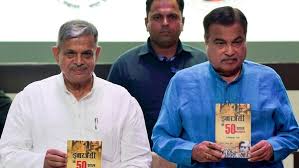Need to discuss if socialist, secular should remain in Preamble: RSS Gen Secy Dattatreya Hosabale

RSS General Secretary Dattatreya Hosabale has reopened a long-standing debate. He questioned whether the words “socialist” and “secular” should continue to appear in the Preamble of the Constitution.
Speaking at a recent public event, Hosabale suggested that these terms may not reflect the nation’s true character. He said, “It is time we discuss whether these words still match India’s spirit.”
How the Words Entered the Constitution
“Socialist” and “secular” were added to the Preamble during the 42nd Amendment in 1976. This change happened during the Emergency, a time when democratic rights were curtailed. The amendment was pushed through by then Prime Minister Indira Gandhi.
Many legal scholars and political critics believe these terms were added for political reasons, not with wide consensus. The original Preamble, drafted in 1950, did not include them.
The RSS Viewpoint
The RSS has always viewed these additions with caution. While the organization hasn’t officially demanded their removal, leaders have often expressed doubts about their relevance.
Hosabale’s recent statement is among the most direct yet. He emphasized that India must think for itself rather than copy Western ideas. “Is secularism just about keeping religion away from politics? Or is it about respecting all faiths equally?” he asked.
He also raised questions about the term “socialist.” “Does socialism mean state control over everything? Or can we define our own welfare model?”
Mixed Political Reactions
Hosabale’s remarks drew strong responses. Congress leader Jairam Ramesh accused the RSS of trying to change the Constitution’s soul. “This is part of their long-term plan to turn India into a religious state,” he said.
CPI(M) leader Sitaram Yechury also criticized the statement. He warned that removing “secular” from the Preamble would threaten India’s pluralism and diversity.
However, others saw value in public debate. Former Attorney General Mukul Rohatgi noted that “Discussion is healthy. Our Constitution is not untouchable. If society evolves, laws and values can evolve too.”
What Do These Terms Mean?
In India, “socialist” has a broad meaning. It refers to a system that ensures equal opportunities, reduces inequality, and promotes welfare for all.
“Secular”, on the other hand, means the state should treat all religions equally. It should not favor or discriminate against any faith. This version of secularism differs from Western models and is rooted in Indian traditions like “sarva dharma sambhava” — equal respect for all religions.
Hosabale stressed this difference. He said, “Indian secularism is not about removing religion. It’s about respecting every belief system.”
Experts Urge Clarity
Legal scholars agree that the Preamble is symbolic. It doesn’t carry legal force like other parts of the Constitution. But it does serve as a guiding light for how laws and institutions should behave.
Dr. Faizan Mustafa, a noted constitutional expert, said, “The question is not whether the words should stay or go. The real issue is whether changing them will alter India’s values. The Preamble represents our national vision.”
Public Dialogue and the Path Ahead
Many observers believe that Hosabale’s comments can lead to productive debate. A nation as diverse as India must regularly reflect on its principles. But critics warn that the debate should not be used to push divisive ideologies.
Some worry that removing “secular” may weaken safeguards for minorities. Others argue that India can stay inclusive even without the word if its spirit is preserved.
Supporters of change say the terms have been misused. They believe India needs a fresh look at its founding document — one shaped by its own culture, not borrowed ideas.
Conclusion
The RSS General Secretary’s comments have put the spotlight back on the Preamble — the heart of India’s Constitution. Whether the terms “socialist” and “secular” remain or not, the country now faces a bigger question: What kind of Republic does India want to be?
Debates like this are important in a vibrant democracy. They help us think about who we are — and where we’re going.






